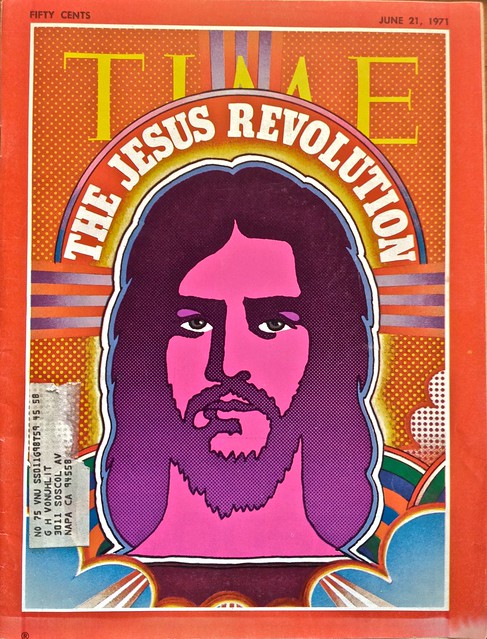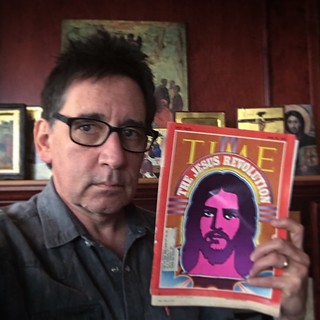The Jesus Revolution

The Jesus Revolution
Brian Zahnd
You say you want a revolution
Well, you know, we all want to change the world
—The Beatles
During the heady days of the Jesus Movement there was a pervasive conviction among the young people involved that we were part of something revolutionary. Our lives had been radically transformed by Jesus and we wanted to relive the Book of Acts. Church as usual was not an option for us. We weren’t interested in being conservative or playing it safe. We carried a strong counterculture ethos. We saw Jesus as a revolutionary and we wanted to be revolutionaries too. We shared much of the theology of conservative evangelicals, but our vibe was decidedly counterculture, with our long hair, patched blue jeans, and tie-dyed t-shirts. We preached on the streets, in the bars, and at rock concerts.
More significantly we had inherited a distrust of government and a disdain for war from the Vietnam era. We saw a Christian critique of war as being faithful to the revolutionary Jesus of the Sermon on the Mount. We had no interest in serving the political causes of either Republicans or Democrats. We saw Christianity as a revolutionary movement that was incompatible with power-hungry political parties. We wanted to change the world in the name of Jesus; we weren’t interested in who was the current resident of the White House or the composition of Congress in the name of politics.
But that began to change in the Eighties as we were drawn to the siren call of Jerry Falwell and his Moral Majority. It was the beginning of a turning away from a revolutionary Christianity toward a politicized Christianity complicit with partisan politics. For me it was the beginning of a big mistake.
I began my pastoral ministry during the rise of the Religious Right; conservative Christians were ready to “take back America for God.” Evangelicalism was about to become a voting block. The Moral Majority, the Christian Coalition, and Focus on the Family would all become nationally known organizations galvanizing evangelicals as a political force. “Christian Voter Guides” would be distributed in evangelical churches across the country.
The central issue that initially energized the movement was abortion. Since the Republican Party shared the evangelical view on abortion, evangelicals bought into the entire Republican platform. Eventually, support of gun rights, capital punishment, mandatory sentencing, welfare cuts, increased military spending, covert action in Latin America, and the invasion of Iraq came to be regarded as the “Christian position.” And I went along for the ride.
I shared platforms with Pat Robertson and Dick Cheney. Senators John Ashcroft and Jim Talent spoke in my church. We handed out those voter guides. We learned to be pro-life and pro-war — and never saw the stunning incongruity! But all of that came to an abrupt end for me in 2004.
The epiphany came when I was sitting, of all places, on a platform with Dick Cheney at a campaign rally. I suddenly realized I was nothing more than a puppet in a high-stakes game of power politics. I was being used. I was being asked to exploit the name of Jesus to endorse some politicians. It was a Damascus Road moment for me. “Brian, Brian, why are you politicizing me?” Like Saul of Tarsus I saw the light and was converted. I couldn’t exit the arena fast enough. My exit from that campaign rally in 2004 was my exit from the Religious Right. I was on my way to finding something truly revolutionary. I was discovering that the revolution of Christ is the radical alternative to the unimaginative politicism of the religious Right and Left.
It’s not that Jesus is apolitical. Far from it. Jesus is intensely political! But Jesus has his own politics — and they cannot be made to serve the interests of some other political agenda. As Eugene Peterson says, “The gospel of Jesus Christ is more political than anyone imagines, but in a way that no one guesses.” The politics of Jesus are set forth in the Sermon on the Mount — and neither the Republican nor the Democratic party have any intention of seriously adopting those politics! They simply cannot.
The politics of the Sermon on the Mount are antithetical to the political interests of a military and economic superpower. The problem with both the Christian Right and the Christian Left is that they reduce “Christian” to the diminished role of religious adjective in service to the all-important political noun. But as Karl Barth taught us, God cannot serve some other interest, God can only rule.
The revolution that is intended is the revolution that occurs when we seriously begin to live under the reign and rule of Christ. The kingdom of Christ is the most revolutionary politics — perhaps the only truly revolutionary politics — the world has ever seen. Unlike all other political agendas, the supreme value of the politics of Jesus is not power, but love. Jesus rejects the politics of power for the politics of love.
The politics of Jesus is without coercion. The kingdom of God persuades by love, witness, Spirit, reason, rhetoric, and if need be, martyrdom — but never by force. Conventional politics is a contest to gain the use of coercive force. But Jesus rejects this method. In the politics of Jesus the world will be changed by non-coercive love or not at all. It’s not the task of the church to change the world by legislative force. It’s the task of the church to be the world changed by Christ. This is revolutionary in a way that conventional politics never can be.
Evangelicalism’s participation in the “culture wars” has been an absolute disaster. It was destined to be a disaster from the beginning, because from the outset evangelicals conformed to the conventional assumptions of power politics. With a naïveté that was breathtaking, evangelical Christians thought that Christlikeness in a culture could be achieved by coercive legislation and the American electoral process.
It began with Jerry Falwell’s Moral Majority and it culminated in the controversial presidency of George W. Bush. Was it worth it? Was it worth transforming “evangelical” from someone who believes in a personal experience with Jesus Christ to a synonym for a petulant Republican? Of course it wasn’t worth it! The only positive thing that can come from the experience with the culture wars is to learn this bitter lesson: adopting the means of partisan power politics is an abject betrayal of the revolutionary way of Jesus. We don’t need to change the world. Not like that. Not by coercion. Not by trying to heap blame and shame on half the population. Not by legislative force.
Trying to change the world by coercive force is not changing the world; it’s simply reconfiguring the structures of power. If we are going to attempt something as grand as “changing the world” at all, we do so by being that part of the world changed by Christ. That’s the revolution we can believe in!
“Pro-life” (as a guiding principle and not an empty slogan) is an excellent way to go about identifying the politics of Jesus. Followers of Jesus should be for all that tends toward life and against all that colludes with death. Which is why I’m opposed to the death-friendly practices of abortion, capital punishment, torture, war, predatory capitalism, environmental exploitation, unchecked proliferation of guns, neglecting the poor, refusing the immigrant, and keeping healthcare unaffordable to millions.
But even with these pro-life issues I’m not focusing on the coercive means of legislation, but witnessing to the politics of Jesus. It’s enough for the church to embody the ethics of Christ. The church doesn’t need to enforce this revolution, the church only needs to live it.
To those who will dare to adopt the politics of the Sermon on the Mount, Jesus says, “You are the light of the world. A city built upon a hill cannot be hid” (Matthew 5:14). This revolution is nothing like the American Revolution with its musket-toting minutemen or the French Revolution with its bloody guillotines. This revolution was played out in the Book of Acts as small bands of people learned to live under the revolutionary reign of Jesus Christ, so much so that it was said of them, “These people who have been turning the world upside down have come here also…They are all acting contrary to the decrees of the emperor, saying that there is another king named Jesus” (Acts 17:6–7). That’s the revolution we are to belong to!
—Water To Wine, pp. 44–49
BZ

Viva la revolución!